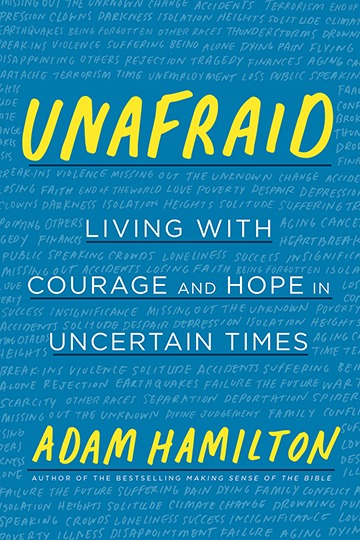Hamilton to tell how to confront fear
Q&A with the pastor who draws on scripture in “Unafraid”
Renowned author Adam Hamilton, senior pastor of Church of the Resurrection in Leawood, Kan., recently sat down for a question-and-answer session about his motivation to write Unafraid: Living With Courage and Hope in Troubled Times.
What personally inspired you to pen Unafraid?
We all wrestle with fear at times. Some fear is good; it can be a gift that protects us from harm or motivates us to act when action is needed. But fear can also paralyze us or lead us to act in ways that are unhealthy. Sometimes, our fears are appropriate responses to real threats. But often our fears are, as some have described them, False Events Appearing Real [FEAR]. In the last couple of years, sociologists have noted a significant rise in fear in America due to a number of factors.

I’d seen an increase in fear in congregation members over the last couple of years, and I’d listened to friends as they described their own fears. As I began exploring scripture, I found that over 140 times the Bible addresses fear — it is a major theme in scripture. Again and again, God tells his people, “Don’t be afraid!” This became the impetus for the book. I ended up surveying the congregation to see what their fears were, and I read everything I could get my hands on about fear. The book was the result of this study.
How can we use our fears as motivation in daily life?
Fear is a powerful motivator, and it can be used for good or evil. Leaders can use fear to manipulate people into doing terrible things — genocide is nearly always fueled by fear. But fear can also be a very positive motivator. I recently had a physical and found that several of my health indicators were borderline or above. It was a bit of fear that led me to exercise and change my diet, dropping 10 pounds. Fear of failure can lead us to try harder. Fear of growing old without enough income can lead us to save for retirement. Fear of getting a ticket leads us to wear our seat belts and drive the speed limit. Fear of getting sick leads us to wash our hands. The biblical authors spoke of the “fear of the Lord,” a holy and appropriate reverence, awe and respect that is meant, they taught, to lead us to seek to live for God. But for each of these positive ways in which fear can motivate us, taken too far, can lead to unhealthy fear.
What is the first step in not allowing our fears to paralyze us?
In the book, I speak of four steps to keeping our fears from paralyzing us. I’ll mention just one of these: “Examine your assumptions in the light of the facts.” Therapists speak of this as “cognitive restructuring.” In some cases, simply gaining more information can help alleviate our fears. I give a number of examples of this in the book where very common fears in our society are shown to be based on completely false information. When people have the facts, it has a remarkable impact on their fear. At other times, it is confronting our fears — leaning into them. Therapists speak of this process as “extinction.” There are many other strategies I outline in Unafraid for finding courage and hope in the face of our fears.
Can we use our fears as a bridge to unity in troubled times?
Fear, like tragedy, has the capacity to unify people. Think back to the days following 9/11 when the nation came together in response to this national tragedy. We were no longer Republicans or Democrats. For a short while, we were Americans facing our fears and seeking to understand and address a common enemy. Yet, as often as not, fear can be one more vehicle for dividing us. Some fear the role that access to guns plays in mass shootings. Others fear laws that restrict law-abiding citizens from buying guns. Nearly every major debate that divides us today includes some element of fear on both sides of the divide.
We’ll never completely eradicate fear, nor should we — it plays an important part in our lives. But we can find ways to live with courage and hope despite our fears. That is what I’m hoping the book helps readers discover.
Published: Tuesday, February 20, 2018
